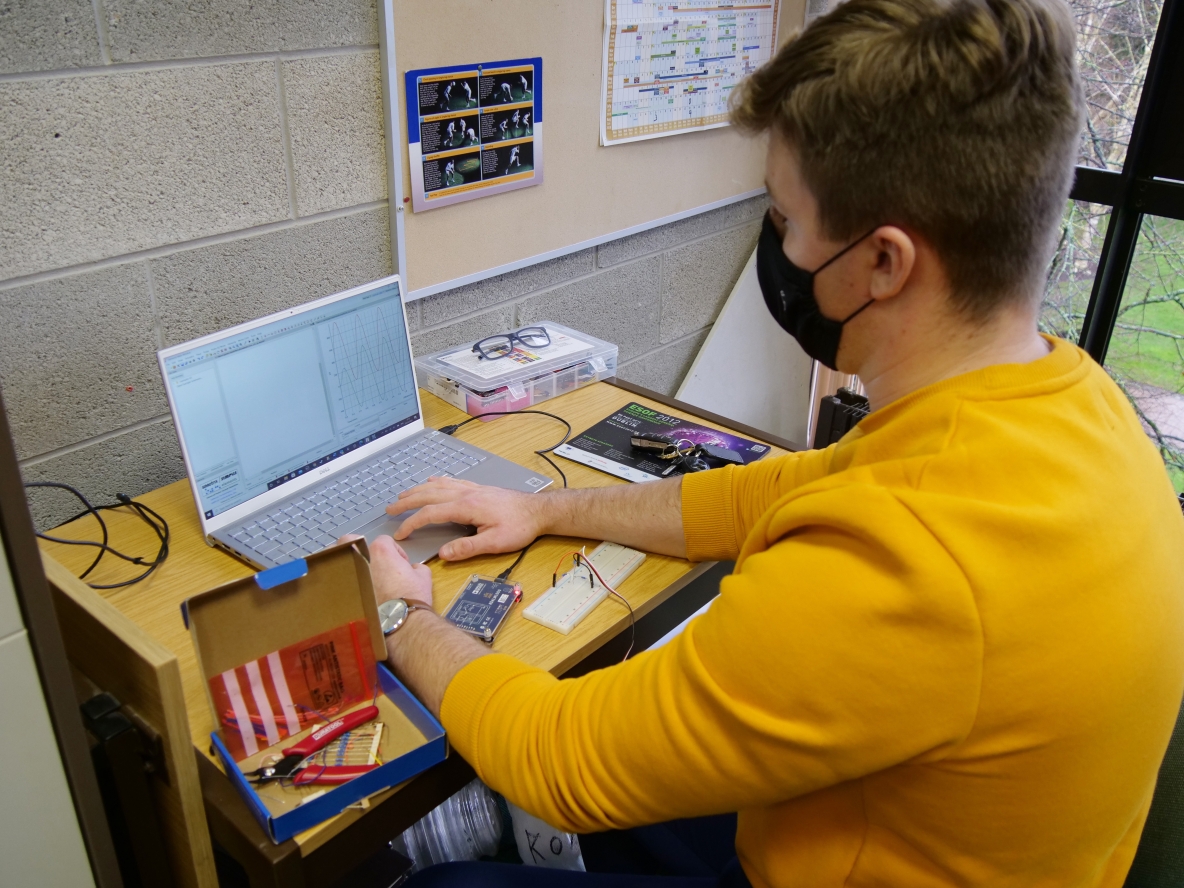
A new remote active learning device has enabled engineering students at University of Limerick to recreate the lab environment at home through technology developed by Analog Devices Inc.
Over 400 engineering students at UL have been using equipment provided by Analog Devices to further learn the fundamentals of electrical and electronic engineering from the safety of their home.
The innovative partnership has assisted UL students in overcoming the challenges to on-campus teaching and learning presented by the COVID-19 pandemic.
It is one of the first approaches in Europe to build a structured curriculum for fully remote experimental learning.
The digital learning partnership was officially launched at a virtual event hosted by UL’s Bernal Institute this Wednesday, attended by Tánaiste Leo Varadkar, Minster for Minister for Further and Higher Education, Research, Innovation and Science Simon Harris, UL President Kerstin Mey and Analog CEO Vincent Roche.
Professor Martin Hayes, Head of UL’s Electronic and Computer Engineering Department, said that the project was a practical response to the restrictions that COVID-19 had placed on face to face contact with students.
“Working with Analog Devices, we came to the conclusion that not only was it possible, but actually it was desirable to give our students Analog Devices kit, in order to allow them to work at home,” Professor Hayes explained.
“We have found that students are spending longer studying the material, they are spending longer validating the concepts that have been presented through practical work that they are required to build themselves – they are becoming experts more quickly just by learning how to recreate their lab environment.
“It has also highlighted some of the research themes that Analog Devices and the Bernal Institute at UL are working together on in relation to fast-charging of batteries, the type of materials that go into batteries and the integration of renewable energy onto the grid. Lots more engineers and scientists will be required to meet these sustainability and self-sufficiency challenges if we are to meet our climate change targets moving forward.
“It is a virtuous circle of technology enabling innovative education in a blended learning environment that is helping us grow the engineers for the 21st century that are going to be able to meet these challenges. This whole initiative is helping us to do just that,” Professor Hayes added.
The partnership approach between UL and Analog Devices provides a template for the challenge based degrees that are envisaged as part of the new UL @Work programme which has been funded by the government through the Human Capital Initiative.
Speaking about the partnership with Analog Devices, UL President Professor Kerstin Mey, said: “The active learning initiative is the latest collaboration between University of Limerick and Analog Devices in a relationship that dates back to the 1970s when NIHE’s founding president Professor Ed Walsh welcomed Hank Krabbe to Plassey to discuss how the new institution might best support Analog Devices’ fledgling expansion into Europe.
“Fast forward to today and once again UL is partnering with Analog Devices, this time to support students discover science and technology at home,” Professor Mey said.
Mike Morrissey, Technology and Catalyst Director, Analog Devices said: “The active remote learning initiative is the most recent manifestation of a deep and longstanding partnership between UL and Analog Devices.
“COVID-19 has been a great challenge to us all in so many respects, but it is not being allowed to hinder the creation of the next generation of engineers through our combined efforts and collaborations.”
Ray O’Brien, Enterprise Manager at UL’s Bernal Institute, explained that the Enterprise Services division in Bernal led the project as “the Institute was best placed to pivot this into the University due to its culture of translational science and a long standing relationship with Analog Devices.
“The vision of this active remote learning initiative is that it will be made accessible across the nation through various Academic, SFI Centre outreach programs and through STEM initiatives,” he explained.
With faculty at UL providing courseware that can be used in the Analog Devices’ online learning ecosystem, Professor Martin Hayes said that “our students have also provided valuable focus group feedback to Analog, and UL, as they seek to support a global pivot toward home learning.
“A crucial component of this learning experience has been the socialised group learning on campus where we have arranged our students into pods and encouraged them to learn together in a hybrid (face to face and online moderated) fashion,” he outlined.
Highlighting that feedback has been “extremely positive”, Professor Hayes said “our first year students have highlighted that this socialized pod based approach to learning has been particularly helpful in aiding their transition to higher education.
“Being part of a shared community of practice in their first weeks at UL has enabled them to feel connected to their University.
“This is the first in a series of initiatives the University will be rolling out over the coming years that will offer our students greater flexibility in engaging with the course content. Our fundamental objective is to build resilience to future disruptions should the need for remote learning become a more common occurrence,” added Professor Hayes.